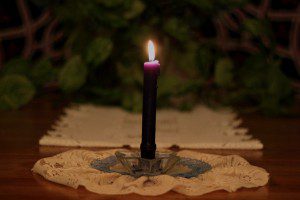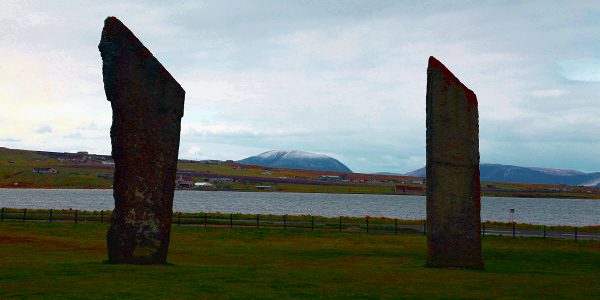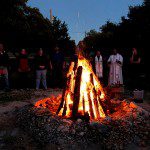 Although I primarily blog about Paganism and polytheism, I’m also a Unitarian Universalist. When I get the inevitable question “what do UUs believe?” I have a standard answer: we believe it’s not our job to tell you what to believe. It’s our job to love and support each other on our spiritual journeys and to work together to build a better world here and now.
Although I primarily blog about Paganism and polytheism, I’m also a Unitarian Universalist. When I get the inevitable question “what do UUs believe?” I have a standard answer: we believe it’s not our job to tell you what to believe. It’s our job to love and support each other on our spiritual journeys and to work together to build a better world here and now.
A religion with no this-world component isn’t much of a religion. It becomes the kind of “opium” Karl Marx ranted against (overly so – he ignored the good work done by some of his Unitarian contemporaries like Theodore Parker, Susan B. Anthony, and Jane Addams). It tells the oppressed to hope for a future world that may never come. It tells the privileged they have no obligation beyond their own satisfaction and comfort.
But even in a tradition that is strongly this-world oriented, spiritual work is still necessary to keep us connected to our Source. It reinforces our commitment to our values and virtues, which are so easy to forget in our daily busyness. It reminds us that there are things that are bigger and more important than ourselves, and it gives us the inspiration and motivation keep working on them.
The folks at the Gods & Radicals website tend to take an extremely this-world approach to their religion. That’s fine – there is no “proper” mix of worship vs. activism. Some of us are called to be mystics while others are called to be revolutionaries, and I’ve had G&R writers I respect tell me their mysticism and devotion drives their activism. They fill a needed role in the Pagan and polytheist communities.
But last week’s essay “Paganism is Personal, and that’s what makes it Political” by Ginger Drekisdottir has pushed that approach to a point that several polytheists are pushing back – rightfully so, I think. Here’s the opening:
A common refrain I hear in many Pagan spaces, both online and off, is “this is a non-political space” … On the surface, this sounds like a good idea. Paganism is religion, and politics is politics. Paganism should be about bringing people together in honour of our gods and spirits, while politics just divides people and distracts from the reason why we get together as Pagans in the first place.
But, and this is a big “but”, there is a problem with declaring any space, including Pagan ones, as being “non-political”, and that problem is that there are some issues in our society on which it is impossible to be non-political.
The essay goes on to make some valid points about who our religious activities include and who they exclude, both by intention and by omission. But as with so much of the material from Gods & Radicals, it pushes political concerns to the point that it ignores the Gods. That doesn’t work for me or for many other polytheists – including some who are generally supportive of G&R’s goals.
Ever and always, the Gods come before politics.

The Gods are Gods. As a devotional polytheist, I see the Gods as real, distinct, individual beings with Their own personalities, Their own goals and desires, and Their own sovereignty and agency. They are far more than humans, but They are not “wholly other” as Christians claim for their God. Our polytheist traditions teach – and our contemporary experiences confirm – that creating and maintaining close relationships with Them is good and helpful.
The Gods have the perspective of Gods: They may or may not be immortal, but they have the wisdom that comes from thousands of years of experience. They know things we do not, and if They cannot see into the future (I’m undecided, but I tend to think not) They can certainly do a better job of seeing where the current course of events is likely to take our world.
We also possess inherent sovereignty, but where the path is unclear, or where the situation demands a multi-generational approach (i.e. – where I can contribute to the solution but I won’t live long enough to see it completed) I defer to Their wisdom and trustworthiness.
During the Civil War, Abraham Lincoln said “My concern is not whether God is on our side; my greatest concern is to be on God’s side.” Lincoln was a Christian (albeit a very unorthodox Christian) but his concern is valid for us all. Putting the Gods first makes it far more likely I’ll spend my effort on things that will truly help rather than simply on things I’d prefer to do.
There are many approaches to promoting Their virtues and values. I serve the Morrigan by writing about Her and promoting Her message of sovereignty. Some serve Her by learning martial arts and encouraging other to develop their confidence and resolve by doing the same. Some serve Her by caring for veterans and veterans’ cemeteries. Some serve Her by participating in protest marches and providing care to those who are injured or threatened in social justice work. One Goddess (OK, maybe more than one), many ways to promote Her virtues and values.
Do we make the world a better place by changing the laws or by changing the culture? Changing laws is more expedient – changing culture is more sustainable. There is a place for both approaches in the polytheist movement.
I don’t want to exclude someone who supports my ends but not my means. In the polytheist – atheist kerfuffle (that’s been fairly quiet for the past few months, for which I am thankful) I said several times “there is no creedal test to dance the Maypole.” There is also no political test.
I have numerous libertarian friends, many of whom are also Pagan and polytheists. While I’m sympathetic to many of their positions, I believe there are certain areas where collective action is more appropriate than individual action, and I do not believe requiring people to contribute to the maintenance of the overall society is in any way immoral. At the same time, when I look at the effectiveness of collective action over the past hundred years or so, I see very mixed results. The libertarian argument that we should shift back to more individual action has merit.
I’m in sympathy with the goals of most of the folks at Gods & Radicals. But I have serious misgivings about their methods. If you want me to help you burn it all down, you’re going to have to tell me what you’re going to build in its place. History is full of revolutions that replaced one corrupt dictator with another. Our current plutocracy is evil, but I want to know how it won’t be replaced by an equally evil oligarchy or theocracy.
 Come to our Lughnasadh Circle on July 30. Pour an offering to Lugh, and ask Him to bless you with some of His many skills. No one will ask if you’re a libertarian or a communist – no one will care. If you want to discuss politics, there will be plenty of people to talk with… after the circle is over.
Come to our Lughnasadh Circle on July 30. Pour an offering to Lugh, and ask Him to bless you with some of His many skills. No one will ask if you’re a libertarian or a communist – no one will care. If you want to discuss politics, there will be plenty of people to talk with… after the circle is over.
Restoring the Way of the Gods (or reimagining or re-creating, as you prefer) is a goal unto itself. It requires good people of many different political persuasions working together where we have common interests.
There are limits. There is no place for racism in Paganism and polytheism – Stephen McNallen is not welcome at any circle I lead. There is no place for transphobia in Paganism and polytheism – Ruth Barrett is not welcome at any circle I lead. These examples are both obvious and improbable – Stephen McNallen and Ruth Barrett aren’t going to show up at a local Pagan circle in Texas.
The world isn’t divided into good people and bigots. Most of us (all of us?) hold some amount of prejudice within ourselves. We call out bad behavior (gently and politely, where ever possible) and call people back into right relationship with each other. Only when it becomes clear that someone doesn’t get it and has no desire to ever get it does it become necessary to banish them from our communities.
The Gods come before politics. Good religion has both an internal focus (becoming better people) and an external focus (building a better world). Good Paganism and polytheism have both an Otherworldly focus (honoring the Gods, ancestors, and spirits) and a this-world focus (honoring the many living beings with which we share this world). We need both.
But inevitably, conflicts will arise between our religion and our politics. If we are consistent, authentic, and honest, these conflicts will be over priorities and preferences, not over major disagreements in values and philosophy. Each of us must make the decisions that seem best to us, for the reasons that seem right to us.
As for me, the Gods always come first.

















